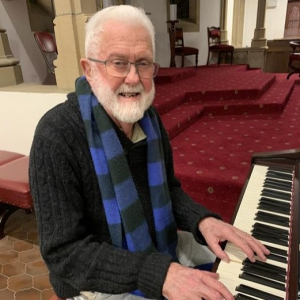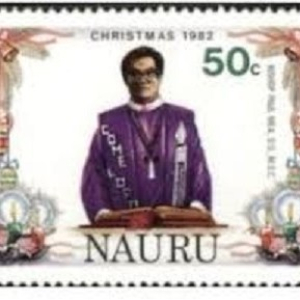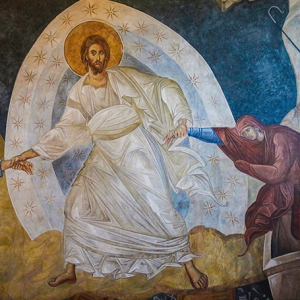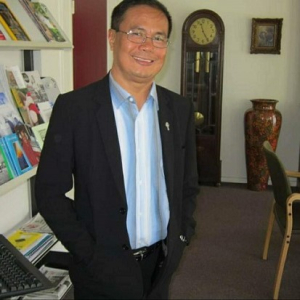Peter MALONE
Children of the Corn/ 2020
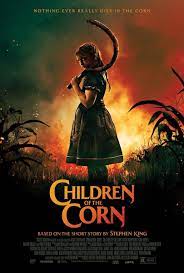
CHILDREN OF THE CORN
US, 2020, 93 minutes, Colour.
Elena Kampouris, Kate Moyer, Callan Mulvey, Bruce Spence, Stephen Hunter, Jayden McGinley, Andrew S.Gilbert.
Directed by Kurt Wimmer.
The first version of Children of the Corn was made in 1984, at the time when so many adaptations of Stephen King’s stories were being made, successfully so. And, this has continued in the succeeding decades, for cinema and television.
This is a rather slight Stephen King story. It has been written and directed by Kurt Wimmer, best known for writing action screenplays rather than for directing.
In some ways, this is an old-fashioned horror film, the setting up of the atmosphere of the cornfields and a strange presence, the threat to the cornfields by so much industrialisation and pesticides, the creation of a cornfields’ monster. And, there is the portrait of the small town in Nebraska, the glimpses of the adults, dealing with the destruction of the corn. But, more, there is the portrait of the children, seemingly possessed by the power in the corn.
This film was filmed in New South Wales, farm and town locations, and several of the cast, the adult males, Australian character actors, Bruce Spence, Callum Mulvey, Andrew S.Gilbert.
Top billing is given to Elena Kampouris s Bo (the daughter in the My Big Fat Greek Wedding sequels), who is meant to be a character of commonsense, enterprise, offering advice to the adults, mediating with the malevolent leader of the children. She is played, frighteningly effectively by Kate Moyer. One difficulty with the atmosphere of the film is the director’s decision to give so many close-ups for Bo, her fears in terror, trying to force the audience to identify with her.
There is a sense of menace throughout. There are some very gory killings of the adults, especially the bulldozing of soil over adults in a pit, a mass grave. Ultimately the corn stalk creature emerges, menacing. As with so many stories, there seems to be a satisfactory resolution – until a final image of horror.
- Remake, the original in 1984? Stephen King story?
- The locations, the Nebraska town, the cornfields, homes, streets, barns, meeting halls? New South Wales locations standing in? The musical score?
- The horror elements? The mystery in the cornfields? The background of the fertilisers and the destroying of the crops? Evil powers and the creature in the corn? The effect on the children? The initial killings, the reaction of the farmers, the possession of Eden and her leadership?
- The atmosphere of the opening, the rustling through the cornfields? The later images of the fields, vast, aer go ial shots, the decay and destruction? The final burnings?
- The opening, the boy emerging, confronting Even, into the orphanage, killing everyone? Saying she was safe? The police, the sheriff, the meetings, the issue of Eden and the pastor looking after her? The situation with the crops, the meeting, the speech about the insecticides, the decision to sell the crops to the company and destroy them? The reaction of the children?
- Bo, her brother, the other children, relationship with her father, plainly to leave to study, concern about the crops? The meetings, her opposing her father? Her friends, contacting the journalist, The planned campaign, the confrontations with Eden? The plan for the trial, with her father at home, her brother, his drinking? The cuffs, taking him to the trial?
- The character of Eden, her age, orphan, possessed, her command, unemotional, the Red Queen and Alice in Wonderland? Her power over the children? Are ruthlessness? The sheriff, and him up, his death? Putting the adults in the pit, covering them with earth? The confrontation with the pastor, accusing him, gouging out his eyes?
- The focus on Bo, the continual use of close-ups on her face, terrified (overreliance on her terrified face)?
- The revelation about the journalist, hanging her up, transporting her, tearing her apart?
- The buildup to the confrontation, the barn, Bo, the gasoline, it’s leaking out of the barn, Eden and her demands, the match, Bo and the threats? Her escaping, in the car, Eden in the back of the car?
- The buildup to the finale, Bo and the cigarette lighter, Eden, the creature coming out of the corn, the confrontation, the other children? The dropping of the cigarette lighter, the flames, through the corn, the creature destroyed, Eden in the corn?
- The aftermath, the horror trope, the creature and taking over Eden, the confrontation?
Riceboy Sleeps
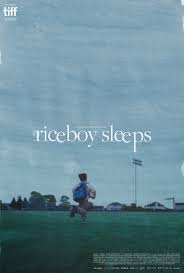
RICEBOY SLEEPS
Canada, 2022, 117 minutes, Colour.
Choi Seung-yoon, Ethan Hwang, Dohyun Noel Hwang, Anthony Shim, Hunter Dillon, Jerina Son, Kang In Sung, Choi Jong-ryol.
Directed by Anthony Shim.
This film is a memoir, going back over 30 years, 20 years, the life of the writer-director and editor, actor Anthony Shim. It is a dramatisation of his early life, an opportunity to remember, re-enact, a tribute, especially to his mother.
In recent years there have been quite a number of prominent films with a Korean-North American interest, the Oscar nominee, Minari, the story of an orphan and adoptive parents, Blue Bayou, the 2023 much-awarded drama, Past Lives. Riceboy Sleeps finds its place amongst this trend and these films.
Anthony Shim has invested a great deal of emotion in this film and invites us to appreciate it, to share it. There is a sad prologue explaining how a 30-year-old Korean woman marries, her husband mentally ill and killing himself, leaving her with a little boy, some alienation from his family, and migration to Canada.
The first part of the film is set in 1990. The mother is a resourceful woman, finding a job in a packing factory, at first isolated, eating alone, for instance, but meeting another migrant, offering friendship and support, and building up great rapport with the other workers in the factory. Her son, Dong-hyun (Doyung Noel Hwang) is five, bespectacled, reluctant to go to school, tantrums, some bullying, the children mocking his Korean food (and his throwing it out and asking his mother for sandwiches for lunch), his standing up for himself in a fight, but suspended, his mother arguing with the principal the injustice of this. And, he has to find an Anglo name, wanting Michael Jordan but his mother forbidding it. David is the compromise.
The acting of Choi Seung-yoon, dancer and this her first feature film role, is always moving, a credible portrait of a woman challenged by hardship, but loving her son.
The second part of the film takes place in 1999, David now 15 (Ethan Hwang), dying his hair yellow, one of the boys around school, a friend to lead him astray, introducing him to drugs, some moody episodes with his mother. She has continued working at the factory, bonding with the women there. And, a gentlemanly man, Simon (played genially by Anthony Shim himself) is attracted to her, wants to care for David, proposes.
However, there is a deeply felt personal issue for the mother, confiding in Simon, her friends, and in David. She tells a symbolic story from Korean mythology of a dying mother being carried on a pilgrimage by her son to the top of a mountain but her dropping rice along the path so that he will be able to have a secure return.
The third part of the film is the mother’s symbolic re-enacting of this story, taking David to Korea, his curiosity roused because of a class project on writing the family tree and his realising he knows nothing about his father. The audience accompanies them on this visit, wonder at the beautiful scenery, curiosity at meeting the rice farmer family, the welcome, the genial grandfather, the grandmother mentally disturbed still about the fate of her son. We are glad that David and his mother have made this visit.
And, finally, ascending mountain to find her husband’s grave and headstone, rituals performed, David experiencing his heritage, family warmth, long cultural traditions.
Riceboy Sleeps leaves the story at the turn of the millennium – but, with the director and this achievement in his film, we are assured of the positive results of his young and teen experiences – and the profound influence of his mother.
- The title? Dong-hyun, as a little boy, as a teenager? The film as a memoir, the writer-director-editor, back to the 1990s?
- The emotional intensity of the film, the introduction, the mother and her background, her marriage, the difficulties, her husband, schizophrenic, suicide? The relationship to his family? And the later visit? Her migration to the Canada? Her relationship with her son?
- 1990, migrants to Canada, acceptance/not? Koreans in Canada? Forming a community? Work, companies, friendships and support? The bosses? The supervision? Yet the loneliness, sometimes eating alone?
- Mother and son, the little boy, his age, glasses, manner, going to school, and willing, in the class, the welcoming teacher, the children, the comments, mocking his food, is tipping it in the rubbish, asking for sandwiches for lunch? Tantrums, in the car, at home? His mother’s care, exasperation, concern?
- Bullying, the mother’s advice about fighting, martial arts, the boy in the classroom, David and his hitting him, the fight, the yard, mother being caught by the principal, her taking a strong stand about the suspension, the issue of the other parents?
- The mother, at work, hard work, the newcomer making mistakes, the friendly reach out, the bonding? Support? But, over the years, growing support from the other workers, settling into Canada? The first part of the film establishing the characters, the relationship, feelings? And the issue of choosing an Anglo name, the discussions about Michael Jordan? Settling on David?
- The transition to 1999, David at 15, appearance, dyed hair? At school, his friends, the teacher and the project about the family tree? His knowing nothing about his father? Harry, sleep at his desk, the friendship, at home, the drugs, getting high? The effect on him?
- The scenes at home, David at times of hand, speaking English and chorion, meals, 15-year-old behaviour?
- The mother, continue it work, her friends, her back pain, the visit to the doctor, the diagnosis, pancreatic cancer, the growth of the cancer, terminal? Her response? Sad?
- Simon, orphan, adopted from Korea, friendship taunts David, towards the mother, the visits, the meals, David and his reactions, the proposal, being gentlemanly, not pressing? The mother asking David, his opinion and reactions? The friends at work, the joy about the proposal?
- Talking with Simon, the diagnosis, suggestions about doctors, the friends and doctors in Korea? Talking with David, his response?
- The decision to go to Korea, the fable about the boy carrying his mother, her leaving the breadcrumbs as a trailer for his safe return? In this symbolic journey into action? The vistas of career, arrival at the in-laws, the brother-in-law and his welcome, the grandfather, his work, the rice, the welcome, the grandmother and her harsh reaction, anger about her son? Having the meal, the conversation? The bonding? The effect on David?
- David learning about his father, the photos? The farewell, the invitation to return? The brother-in-law accompanying them? The baths and the humorous sequence? David and having his hair shorn?
- The symbolic journey, David having to carry his mother, the grave, the Tombstone, celebration of the rituals, the libation? The effect on David?
- In the film is retrospect over 20 years?
Argylle

ARGYLLE
UK/US, 2024, 140 minutes, Colour.
Bryce Dallas Howard, Sam Rockwell, Henry Cavill, Bryan Cranston, Catherine O'Hara, Arianna DeBose, Dua Lipa, Richard E.Grant, John Cena, Samuel L.Jackson, Sofia Boutella, Louis Partridge, Ben Daniels.
Directed by Matthew Vaughn.
Has there been any research done about film fans who decide that they are against a film before they see it, still determinedly actually pay for their ticket, then spend a great deal of their time lamenting about the time wasted in watching the film and devoting more time and energies to badmouthing it, especially on social media, and on movie blogging sites? The immediate response to Argylle would be a good case in point. A great deal of social media time and space devoted to lambasting it.
The accompanying question for discernment would be: why not look at the cast and the director, discern that it would be an action show, espionage, probably a lot of spoof, and, with the history of the director, lots of colour and over the top action: give it a try. There would be quite a number of things to enjoy. And, that is probably the point, Argylle was made for enjoyment rather than for minute critical analysis.
Matthew Vaughn has had an interesting career, from the gangster Layer Cake, X Men, Kick Ass, the Kingsman series. And, this time he has had a $200 million budget. A lot of it up there on the screen in colour, special effects, spectacular action sequences.
The basic idea is enjoyable, Bryce Dallas Howard is Elly Conway, a rather mousy writer of spy thrillers. After a signing she is actually whether like Frederick Forsyth, John Le Carre, she is a spy herself! But, soon she does get herself into spy situations, a scruffy fan on a train, Aidan (Sam Rockwell enjoying himself all the way through) revealed through as many fight variations you can have on a moving train, to be a spy, reader of all Elly’s novels, out to protect her.
We have already seen part of one of her novels in action, with Henry Cavill as her muscular hero (despite that awkward Mohawk hair style), in action in Greece, with his tough associate, John Cena, an agent killed, and an unsatisfactory to Elly’s novel. And, Argylle will reappear throughout the film, in Elly’s eyes alternating between Argylle and Aidan.
While Elly’s mother, Catherine O’Hara, is keen to help her daughter with her writing and plot development, we discover the malevolent influence of the renegade Directory the, Bryan Cranston. Plenty of star power in this film, including Oscar-winner Arianna DeBose as an IT expert spy, Samuel L.Jackson as the retired head of the CIA, Sofia Boutella as an exotic mastermind.
Maybe by about a third of the way through or more, there is the temptation to think that this is perhaps a bit more routine than hoped for. But, then the twists start. And then twist on twists! And, the spending of the budget on big action sequences, the audience thinking that one that involves all kinds of smoke and technicolour clouds isn’t bad, but then there is the ice-skating on an armaments floor covered in gasoline, a number of the spectacular leaps and action shots during the skating, some tension in the revelation of who is spying on whom, and a desperate fight interrupting the sending of an important file, a surprise rescue and a final explosion.
This is rather a different role for Sam Rockwell and he seems to relish it. And, a bit more admiration for Bryce Dallas Howard by the end – and, as she grows older, she will enjoy sitting down with her grandchildren to watch it again!
- The films of Matthew Vaughn? Heroes and superheroes? Reality and fantasy? Action? Colour? Effects, action?
- The big budget, the strong cast, the action sequences, choreographed, the special effects, extravagant? The overall effect? “Mindless entertainment”?
- The introduction, the episode in Greece, Henry cavill as Argylle, in action, in the club, the dancer, seductive, explosions, the revelation about controls and the Directory, the glimpse of the Director, the death of the agent in the car, and the dancer scooped by John Cena as he drank his coffee?
- And the revelation that Argylle was a character, Elly Conway as the author, the series of books over five years, bestsellers, the book signing, the fans, asking whether she was a spy like Frederick Forsyth and John Le Carre? Her being quiet and demure, mousy?
- Her relationship with her mother, the phone calls, the discussions of the plot, the mother’s contributions, wanting to come to see her to discuss the developments?
- The train sequence, Aidan sitting in the seat, hair, suspicious, reading Argylle, the discussions, his being a spy, the consequent mayhem, the fights all through the train, rescuing Elly?
- The revelation of the Directory, Rogue agency, Ritter as director, his manner, treatment of his underlings, his rifle, shooting? His wanting to get Elly? The revelation about Elly, the stories paralleling reality?
- The narrative of the plot, comic book, images of Argylle mixing with Aidan during the fights? Argylle and his advice to Elly?
- The importance of Alfie the cat, his appearance, bond with Ellie, her carrying him everywhere, his being in danger, Aidan’s allergy? His part in the heroic action? The discovery of the actual Alfie, in France, Samuel L.Jackson, the visit, the explanation of Pinot Noir, yet his complete set up in France, in the past with the CIA? His determination to unmask and capture Ritter?
- The twists? Dramatically effective? Tantalising? A further twist and revelations? Aidan telling Elly that she was a top agent, her disbelief? Gradual returning of memories? Her mother’s arrival and the truth about her mother, psychologist, the capture of Elly, transforming her character? Her father, Barry – and his threatening Elly, Ritter and his control?
- Ritter and his staff, interrogations of the Elly, discovering where Alfie was? Elly rediscovering her past skills?
- Aidan, his roles in the past, his love for Elly, overhearing him, sense of betrayal? Issues of trust?
- The visit to the Keeper of Secrets, the background of Bakunin, his code, Ritter wanting it, the killing of Bakunin, the interaction with the Keeper of Secrets, her court, socials, Aidan and Elly dancing, not drinking, having possession of the code?
- The buildup to the confrontation, Ritter and his forces, Elly, in the dress, her wig, transformed? Going into action, the gasoline on the floor, the troops, the memories of her skating, the accident, but her skills, getting the knives escapes, the choreographed skating, the aerial manoeuvres? The buildup with the smoke, the variety of colours, a technicolour extravaganza?
- The irony about the psychologist, Aidan shooting her, the bullet proof vest, her reappearing, Aidan and Ellie trying to transmit the code to Alfie, his watching the sports, the interrupted transmission, the fight, the psychologist and her control, Ellie trying to defeat Aidan? The arrival of the agent (in the background story of the experiments, trajectory of bullets, life saved)? Her getting rid of the psychologist? The successful transmission?
- Argylle and his reappearance? In the novels? His being a James Bond style character? The atmosphere of this kind of international espionage throughout? The irony of the transformation of the mousy author into the super agent? And the romance? And the books?
May December

MAY DECEMBER
US, 2023, 117 minutes, Colour.
Natalie Portman, Julianne Moore, Charles Melton, Elizabeth You, Gabriel Chung, D.W.Moffett.
Directed by Todd Haynes.
May December is a phrase that indicates a relationship between a younger person and an older person – with the note, that the older person is considerably older. This film is based on an actual case in Washington State in the 1990s, a married woman with children and her relationship with a 12-year-old. In fact, the woman went to jail, gave birth to a child in prison, and, when released, married the boy.
However, this film does not focus on the 1990s except in retrospect, in memories, in judgements. Rather, the setting is 24 years later, the couple still married, now with three children, one of them graduating from high school. Which means then that an audience will have a point of view on underage sexual relationships, the law, crime and punishment. However, what the film is interested in is the aftermath, what was the effect of the relationship, what was the effect of the marriage, now almost a quarter of a century later?
The occasion for this story is the decision of a company to make a movie about the woman, Gracie (Julianne Moore). A well-known actress Elizabeth (Natalie Portman), comes to town to be with Gracie, to glean all she can that will enhance her performance. In one sense it is perfectly normal for this kind of research. On the other hand, there are all the personal relationships, the probing of the past, sensitivities. But, the way that Todd Haynes, a long-time director of women, Julianne Moore in Safe and Far From Heaven, with such productions as Mildred Pierce, Carol, introduces Elizabeth, we are wary of her, her motivations, professional approach, personal approach and insinuations.
There are frequent scenes of the two women together, especially looking together into a mirror, reminiscent for film buffs of the photos and posters for Ingmar Bergman’s 1960s Persona, the persons, the masks…
And, significantly, there is Joe, the boy in question, now husband and father, played by Charles Melton.
While the screenplay is well-written, dramatic interactions, emotional crises, a strong sequence where a cheeky kid in a class asks the actress about performing sex scenes and she gives quite an intense reply about the process, the detachment, the involvement, the feelings. The way that the audience will understand each of the characters here is often by their body language, their looks, movements, the ways they suggest the inner emotions for the audience to interpret.
It has been remarked that emotions can be buried deep. And, this is the case for the central characters and it is over to the audience to interpret the words and actions to explore these emotions.
However, perhaps the most accessible character is Joe, who is the character who intrigues. And an often warmly striking performance from Charles Melton. Audiences are used to adult predators, used to performers who also perform in real life. But here is Joe, the history of the relationship, his age and inexperience, the marriage, the children, his decades of being husband and father, and the audience wondering how he is still lost in his past, coming to terms, not coming to terms, needs, hopes, love for his children, trying to be supportive of his emotional wife, often allowing himself to be manipulated by her .
The musical score, pounding at times, his adaptation of Michel Legrand’s score for the British film, The Go-between.
The action in May-December is very much December, time passing, the effects of what happened in May, how much for good, how much for ill.
- The title, relationships, older and younger, considerably older?
- The screenplay based on an actual case, the 1990s, the older woman, the schoolboy, the relationship, the law, in prison, giving birth in prison, out of jail, the couple marrying, more children, the passing of the decades?
- Audience judgements about the issue, moral, legal? The important aspect of the film is understanding what happened in the past, realising that decades had passed, the consequences of the initial experience for Gracie, her family, for Joe?
- The town, homes, streets, beaches, school? Authentic American atmosphere? The musical score (the adaptation from the film, The Go-Beetween)? Highly dramatic and pounding?
- The situation, the company making the film, Elizabeth coming to the town, to get to know Gracie, to learn, background for her performance? The motivations? Status as a well-known star? Her personality, initially tentative with Gracie, the interactions, listening, observing, standing with Gracie at the mirror, Gracie applying the make up, the touches of intimacy? The coming to meals, meeting with Joe, the children? Intentions, infiltrating the family?
- Gracie, age, experience, her former husband, willing to be interviewed, his version of the story, his relationship with his children? Gracie and her relationship with Joe, husband and wife, Joe as father? Her relationship with her older children? With her children with Joe? The scene of getting the address for the graduation? Charlie and his moods?
- The scene at school, Elizabeth and celebrity, the provocative question about filming sex scenes, her intense reply, stage by stage of the experience, detachment, technical aspects, feelings? The audience having this in mind for the sequence with Joe? The daughter and her negative reaction to Elizabeth’s answer?
- Joe, his age, casual work, his hobbies, the plans, explanation to Elizabeth, the skills? Relationship with his children, with Charlie on the roof, the marijuana, his first time, his relationship with his children? The relationship with Gracie, looking after her, the jobs, her taking him for granted but loving him?
- Joe, the past, audience trying to understand, knowing what happened, looking at Joe, his body language, listening to him? Sympathy for him? The encounter with Elizabeth, her being seductive, his response, the sexual encounter? The aftermath?
- The daughter coming home, the airport scene, family together, preparation for the graduation, the graduation scene, the whole family present?
- Elizabeth, the encounter was Gracie’s older son, insinuations, requests for the job as a music supervisor?
- The effect of the visit, Elizabeth so often present in the house? Gracie and her becoming wary? And how she was going to be portrayed in the film? The growing sense of alienation? Elizabeth leaving?
- In the future for the children, going off to college, leaving home? The future of Gracie and Joe?
How to Have Sex
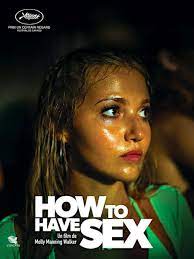
HOW TO HAVE SEX
UK, 2023, 93 minutes, Colour.
Mia McKenna-Bruce, Lara Peake, Enva Lewis, Samuel Bottomley, Shaun Thomas.
Directed by Molly Manning Walker.
There can be many responses to the straightout, rather blunt title. There are those who are pruriently curious – but very quickly they would lose interest. The those who might think this an educational documentary – and, in some ways it is, a docudrama about school leavers, rituals of holidays and freedom, letting go. But, many might suspect – and, of course, this is true at the end – the meaning of the title is actually: How Not to Have Sex.
This film has made quite an impact in the UK but, especially in festivals around the world. It has received to date 43 awards and nominations, including winning the prestigious section at Cannes, Un Certain Regard. Molly Manning Walker has received awards and nominations for her writing and direction. Mia McKenna-Bruce has also won awards for her central performance as Tara.
The target audience is teenage, the central characters here aged 16. And, the focus is on the girls, boys there, in the background, some moments in the foreground, but this is the girls’ story, especially Tara’s. They go to Greece, it is an adventure, sense of freedom – and the three are very much into the boisterously extroverted partying (the first part of the film may not appeal to introverts, that is for the last part, the meaning of the film). The first half hour of the film is almost non-stop partying, noise, music, adolescence making loud whoopee, so to speak.
Tara’s two friends, Skye and Em, enthusiastically urge Tara on, especially in terms of sexual experience. However, Skye is friendly but not particularly empathetic. Em, on the other hand, a clever student at school, is alert to Tara’s feelings and show some sensitivity.
The two boys at the centre of the film share in the boisterousness, Paddy, Samuel Bottomley, seems fairly straightforward. On the other hand, Badger, Shaun Thomas, is multi-tattooed, drives a van, blonde tints in his hair, liking Tara, involving her in some raucous behaviour, but, more sensitive to her.
Parents are merely mentioned, some communication by phone and text, otherwise absent.
The director is quite reticent in dramatising the key sexual encounter at night on a beach. The film quietens down, focuses on Tara, wandering, retiring to her room, rather bewildered, a 16-year-old who thought she might know everything finding that she does not know much at all about herself, sexuality.
Which means that while the “Spring Break” shenanigans continue, the film focuses on Tara, alone, supported by Badger, trying to resist another encounter with Paddy, and everyone packing up to go home, Skye and Em having had the holiday that they were anticipating, but Tara, not knowing how to react, sometimes playing up to the expectations, but still upset in her own inner life.
Will the target audience just respond to the partying or think through Tara’s experience? And how would this film be helpful for parents, teachers, counsellors?
- The title? Straightforward? Ironically negative?
- British perspective? Students, girls, boys, the absence of parents except by phone and text?
- End of academic year ritual, holidays together, resorts, letting go, sense of freedom, drinking, flirting, sex, drugs? Boisterous extroverted activities?
- The Malia setting, Greece for holidaymakers, the British? The age group, studies and exams, success and failures, further education, decisions about work and life? Letting go for the holiday?
- The boisterous scenes, the partying, noise, energy, one party after the other?
- The three girls, their friendship, the focus on Tara? Arrival, wanting the pool-view room, Tara persuading the receptionist? Enjoying the luxury, sunbaking, swimming? The characters, their age, Tara and her uncertainties, not knowing what to do in life, virgin, outlook on sex? Skye, more outgoing, dominating? Em, relationships, friendship with girls, straight A’s in exams, prospects?
- The behaviour, the encounter with the boys, the activities, the drinking, Paddy, straightforward looking, behaviour? Contrast with Badger, tattoos, hair, van driving? The interactions with the girls? Skye and Em urging Tara?
- The episode on the beach, Tara and Paddy, going into the water, her uncertainties, expectations, awareness at 16, the sexual encounter, the film not focusing on the detail? The aftermath, her wandering, her staying more by herself, the reaction of her friends?
- Badger, more sensitivity towards Tara, wanting to walk home, stay with her, listen, attentive?
- Paddy, not noticing Tara, not appreciating her feelings, the return to the bedroom, Badger seeing them in the bed, his concern?
- The effect on Tara, what she was wanting, what she was expecting, what actually happened, a lack of experience in dealing with what happened, wanting the time alone, Badger letting her be quiet? The depth of feelings, wanting time to reflect, yet not having the maturity, bursting out, playing up to the gallery at times?
- The end of the holiday, Em and her success with exams, her sensitivity towards Tara, especially listening, alert, the airport? Skye and her lack of awareness?
- The target audience, especially girls, identifying with the characters, the situations, the dilemmas, the moral issues, coping and not? Parents, teachers, counsellors?
.
RIP, Fr Kevin Bates SM
RIP, Fr Kevin Bates SM
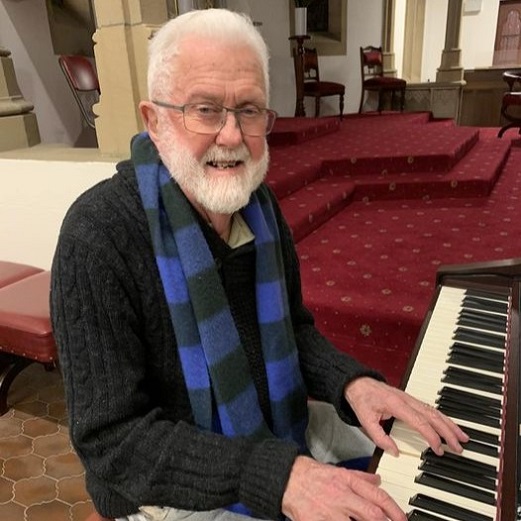
Funeral, February 7th.
Marists and many others throughout the world mourn the death on Jan 31 of their confrere, spiritual guide and friend, Fr Kevin Bates SM (77). After months of failing health, Fr Kevin's last moments were spent at Royal North Shore Hospital, Sydney, where he died peacefully after days of family and fellow Marists by his bedside.
Fr Kevin, the author of many albums of songs, hymns and reflections, is known not only for his musical talents but as a gentle, ever-cheerful and devoted guide and pastor. Prior to his retirement he had been parish priest of Holy Name of Mary parish, Hunters Hill-Woolwich, NSW.
Kevin Bates, was born in Geelong, Vic, on Aug 13, 1946, the eldest of five children. His father, Albert, was a house painter and mother, Maureen, a full-time Mum. He was a first-day student of Chanel College, Geelong, where he completed his secondary education.
Entering the Marist seminary at Toongabbie in Jan 1965 and novitiate in Armidale the following year, Kevin was professed in Feb 1967 and ordained priest in Melbourne on May 20 1972. He taught briefly at St John’s Woodlawn College, Woodlawn, NSW, then at St Paul’s, Bellambi, NSW. His next appointment was to the parish staff at St Patrick’s, Church Hill, Sydney, before taking a Masters Degree in Theology at the Jesuit School at Berkeley, California, in 1974-75.
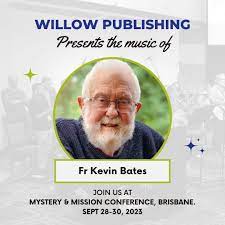
Fr Kevin became Socius of the Marist Novitiate at Toongabbie, 1975-80, and lectured in liturgy at Catholic Theological Union, Hunters Hill, from 1975-83. He helped develop the Marist Centre at Toongabbie as an adult education and retreat centre during the 1980’s before becoming director of Sydney’s Aquinas Academy in 1993. In 2000 he took a Masters of Education Degree at the Australian Catholic University, Sydney.
From 1980 Fr Kevin worked extensively in both primary and high schools around Australia with students and staffs, giving retreats, conferences and in consultancy work. He also gave adult retreats and in parishes a rough equivalent of the old parish missions. Marriage preparation and the celebration of marriages and baptisms formed a significant part of his ministry.
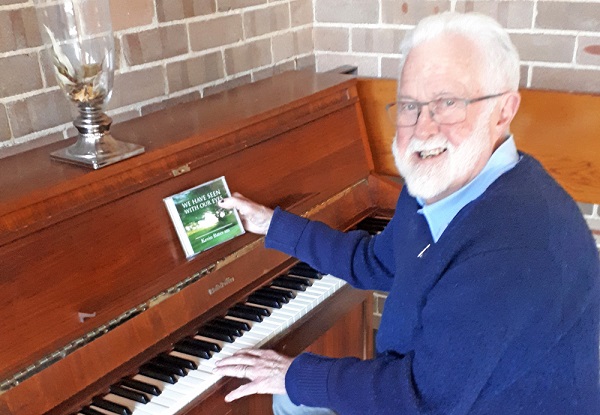
Fr Kevin composed and published many albums of music and contributed to a number of other musical publications. He contributed to various areas of mission, including ‘Spirituality in the Pub’, chaplaincy work for the Edmund Rice Justice Education Centre in Sydney and young adult education programs.
After an extended period as parish priest of Holy Name of Mary parish, Hunters Hill/Woolwich, and with deteriorating health, Fr Kevin joined the community of Maryvale/Montbel, Hunters Hill, where he lived until his peaceful death at Royal North Shore Hospital, Sydney, on Jan 31, 2024. May he rest in peace.
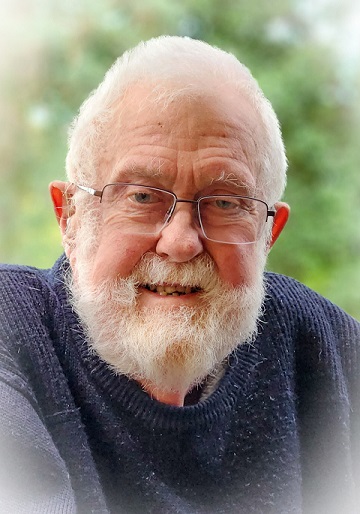
Fr Kevin Bates SM
13.08.1946—31.01.2024
The Laity of the Chevalier Family, Final Report
The Laity of the Chevalier Family, Final Report
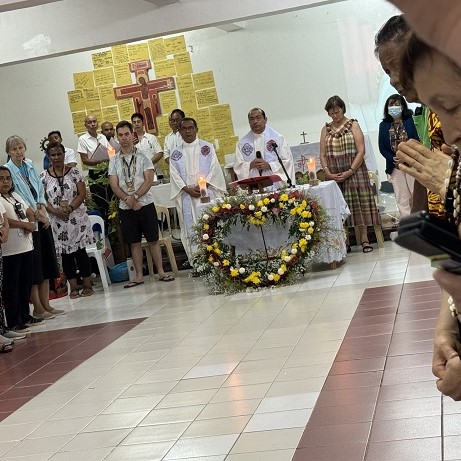
Day 9: The last day of the Assembly is here! We started with a peaceful meditation prayer from the USA and then we sang and danced the Assembly song with gusto for the last time. We came so far from the tentative beginning!
The Assembly Reflecting Team was asked to read the Assembly Statement. Excellent! The right words and the right spirit - it was approved by all.
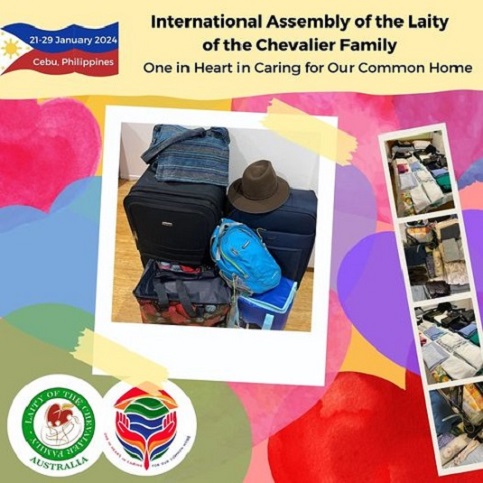
Then Alison McKenzie thanked the outgoing International Council and assistant team for the hard work and support. The new International Council was introduced: Dorothy Pion (PNG), Aidan Johnson (Australia), Petrus Maringka (Indonesia), and Patricia Rivas (Guatemala) who will serve for six years, and Aiyne Morandonte (Philippines) in a one-year appointment to rotating position. As for the Regional Coordinators, Olguita Garcia Ocompo (Peru) for Central and South America, Raphael Kowih (PNG) for Papua New Guinea, and Jos Vriesema (Netherlands) for Europe. Alison reminded us of two metaphors emerging from the Assembly: 1. ‘Like a bridge over troubled waters’ the outgoing International Council created the basic structures to support the Lay Chevalier Family which will be strengthen by the new one. 2. ‘From little things, big things grow’. Like the seeds we planted earlier that were already growing, Alison asks us to sow seeds in our groups and let them grow and to foster the bonds of connection that have emerged.

A brief financial report for the Philippines Assembly was presented by Father Bong, with the final report to come later.
Time for a big ‘thank you’!
Philippines Organising Committee: Deborah Mellijor (Philippines Organising Committee Chair), Father Bong msc (Spiritual Companion), Juan Tero (Philippines National Council Chair), Victoria Ballios (Liturgy Committee Chair), Beinvenida Usog (Finance Committee Chair), Alice Doce (Registration Committee Chair), Ermentia Pogado (Food Committee Chair), Nicanor Calumbia and Pepita Dayonot (Transportation Committee), and Rochelle Silfavan Jessa (Accommodation Committee Chair).
International Council: Sr Merle Salasar fdnsc (Spiritual Companion), Doris Machado (Deputy), Rita Cleuren, and Peter Cheong.
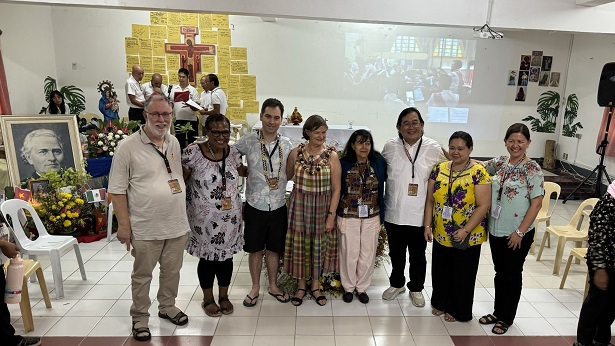
Worked Closely with International Council: Maria Olimpia Klose (Translator), Hannie Jansen (Minutes and Secretariat), Olguita Garcia Ocampo (Regional Coordinator), Fr Richard (Translator), Therese Poulton (Written translator, 6 years), Ana San Martin (Written translator, 5 years), Enrique Barrel (Absent but named, Written translator, 2 years), Patricia Rivas (Written translator), and Aidan and Clare Johnson (IT Gurus).
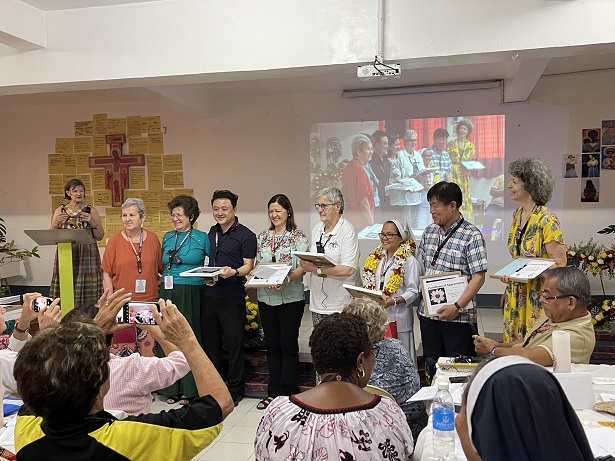
Assembly Translators: Sr Yen, Fr Francis, Fr Joni, Shirley Mohidi, Sr Angela, Sr Luz, Therese Poulton, Anne Gael, Fr Richard, and Sr Faustina.
Technology Support: Sir Jorlan and the team from St Alphonsos.
Religious Who Supported Us: Sr Fabilene fdnsc, Sr Deborah msc, and Fr Abzalon msc (Tri-Generalate Representatives), Fr Edwin msc, Sr Ruth fdnsc, and Sr Carol msc (Regional Leaders).
General-Secretary: Alison McKenzie.
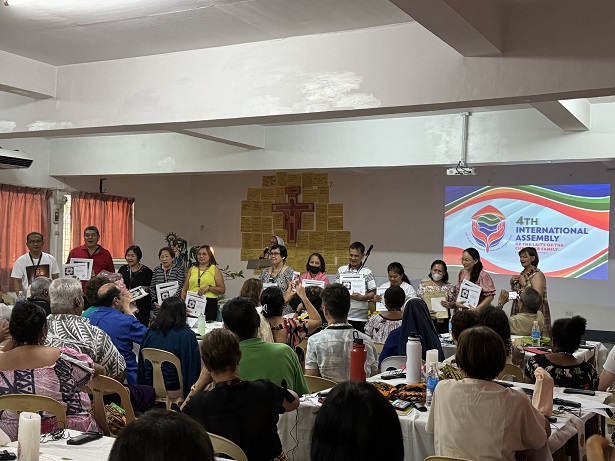
We finished with a signing ceremony that acknowledged each participating country and their commitment to the International Laity of the Chevalier Family, and a celebratory mass that included the commissioning of the new International Council and a commitment prayer said by each delegate. We were reminded by Fr Absalon MSC that we are the message because ‘If you are not the message, what is the message?’ and ‘Be the change you want to see’.

Lastly, Alison officially closed the Assembly, and it was time for joyful, loving hugs and farewells to people who turned into family. What an extraordinary experience it has been!
Some Significant February Days for the Chevalier Family
Some Significant February Days for the Chevalier Family
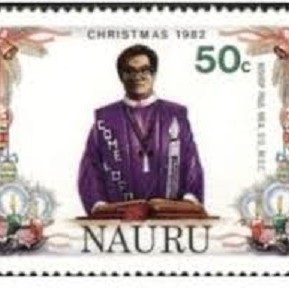
Paul Mea MSC, See February 10th
NOTE:
this is an amplified version of Significant Days, combining the list made originally by Cor Novum, Issoudun, now with the addition of dates from Father Jan Bovenmars MSC’s book, Jules Chevalier, Daily Readings. His book was published in 1993 – so, more recent just from all around the congregation and the Chevalier family would be most welcome.
48 new Significant Days have been added for February.
A post-script for January 31st
An OLSH Day
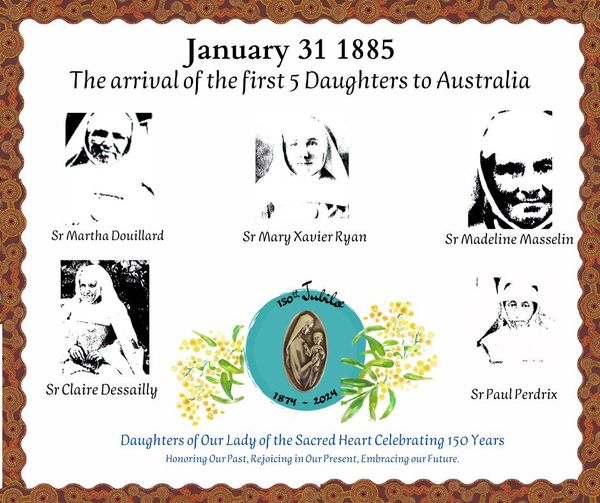
2 February, 1934
The Apostolic Prefecture of the Celebes becomes the Prefecture of the Celebes, Sulawesi, Indonesia.
2 February, 1866
Riedenburg, near Bregentz in Austria, blessing of the first statue of Our Lady of the Sacred Heart.
2 February, 1866
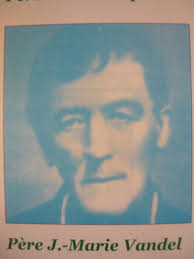
Father Jean-Marie Vandel enters the MSC community at Issoudun.
2 February, 1892
The title of Saint Joseph "Friend of the Sacred Heart" is changed to "Saint Joseph, patron and model of those of love the Sacred Heart".
2 February, 1905
Father Chevalier writes his Spiritual Testament for the of FDNSC.
2 February, 1950
Final Papal Approbation of the Congregation and the Constitutions of the MSC Sisters.
2 February, 1962
Erection of the Irish FDNSC Province.
2 February, 1978
The Foundation stone for the first house of the MSC Sisters in India was laid.
3 February, 1891
Since Father Guyot has sent a letter of resignation as General Assistant, Father Maillard is elected to replace him.
3 February, 1891
The MSC General Council protests against the removal of the Acts of the General Chapter, taken away without authorisation, by the Secretary of the Chapter, Father Klotz.
5 February, 1900
Canonical Erection of the Congregation of MSC Sisters and approbation of the Statutes for five years.
6 February, 1855

Chevalier and Maugenest finish their second novena to the Blessed Virgin. Their prayer is answered. They are promised 1000 francs, per year, from a generous benefactor, for their living expenses.
6 February, 1897
The Holy See authorises the MSC to hold a General Chapter.
7 February, 1895
“From a letter of Father Carriere we learn that Rome will gladly grant us the proper of an office of Our Lady of the Sacred Heart, but a translation of the title OLSH would not be included but would be replaced by “Virgin of the Sacred Heart”. This condition, if insisted upon, is unacceptable.” (Acts of the MSC General Chapter).
8 February, 1894
Fathers Theophile Rein and Jules Vandel and two scholastics leave the Congregation and ask Father Chevalier for his blessing to start a new Institute in Belgium. (Father Vanndel will rejoin the MSC later and will go to Sydney in October, 1894).
8 February, 1925
Erection of the North and the South German Province by the division of the “German” Province, erected in 1897.
8 February, 1927
Erection of the USA District of the MSC, entrusted to the North German Province.
9 February, 1900
Colombo: “by rickshaw to the Cathedral of the Oblate Fathers. I hear that Msgr Couppe is aboard the Caledonia. I pay him a visit.” (de Boismenu, Notebook)
10 February, 1885
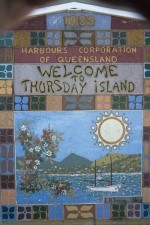
Fr. Verjus and three Italian Brothers leave Sydney for Thursday Island.
10 February, 1979
Father Paul Mea MSC appointed Bishop of Tarawa-Nauru and for 30, ordained Bishop at Tarawa, Pacific Union. He is the first local Bishop of this diocese.
11 February, 1893
Father Jouet ceases as Procurator General.
11 February, 1924
Direction of Tshuapa, Zaire, as Apostolic Prefecture, entrusted to the Belgian MSC Province.
11 February, 1979
The MSC Sisters open a Novitiate in Pusan, Korea.
12 February, 1879
Cardinal Simioni, Prefect of the Congregation of Propaganda, offers to the MSC the mission of Auckland, New Zealand.
13 February, 1869
Third audience of Father Chevalier with Pope Pius IX. He asks the Pope to have the Issoudun statue crowned in his name; the Pope delegates the Archbishop of Bourges for the ceremony. The request to elevate the confraternity of OLSH to an archconfraternity is granted, but for the Archdiocese of Bourges only.
13 February, 1886
The foundation of the Mission seminary at Antwerp, Belgium, approved.
13 February, 1903
Father M Niejens MSC appointed as the first Apostolic Prefect of Dutch New Guinea, Irian Jaya, Indonesia.
14 February, 1877
Henri Verjus starts his novitiate by taking the habit at Saint-Gerand-le Puy France,.
14 February, 1952
The tower of the Basilica at Issoudun has a new spire, with an iron cross on top.
15 February, 1927
The “American District” of the German province is established with Father Joseph Stettner as official representative of the German province.
15 February, 1931
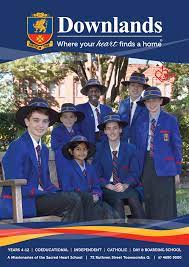
The Australian MSC Province opened its first Boarding School for Boys at Downlands, Toowoomba.
15 February, 1963
Father John Durkin MSC, Ireland, becomes the first Prefect of the Prefecture of Louis Trichardt, South Africa.
15 February, 1981
Fr. Juan Alonso Fernandez, MSC, of the Spanish Province, is violently assassinated in Guatemala.
Juan Alonso Fernandez.
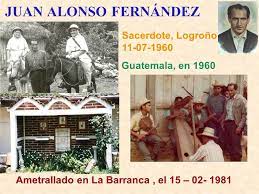
The commander of the post, told him that "it was disgusting for him to have a priest in front of him, that's why he spat on him, because it made him nauseous to see a priest." The Asturian Juan Alonso Fernandez endured a cruel torture that night. He said that "what they wanted was to kill me and I don't know how, they refrained from doing it, because I feel that they would have better killed me and not done what they did to me. In spite of everything, Juan did not give up. He celebrated the Eucharist in the village and went out to celebrate it in a neighboring village. There they waited for him, kidnapped him, tortured him again and shot him three times in the head. Days before, he had said, taking the crucifix that he always carried in his chest: "I became a priest because of this one, and if I have to die because of this one, here I am". It was February 15, 1981. He was 47 years old.
16 February, 1915
Fr. Charles Piperon dies in Thuin, Belgium. He was longtime companion and confidant of Jules Chevalier.
17 February, 1863
Father Chevalier writes: “Abbe de Champgrand stays with us already since last Sunday. I cannot describe his satisfaction. He is enchanted.” The Abbe was the significant donor to the new congregation.
17 February, 1912
Erection of the Quasi-Province of the USA and Canada. Father Pierre L’Esperance was its Quasi-Provincial from 1912-1939.
17 February, 1985

Arrival of the first MSC in South Korea, Father Pedro Arguillas from the Philippines.
18 February, 1936
Official installation of the first MSC from the Canadian Province at Sanchez, Dominican Republic.
18 February, 1986
Erection of the MSC Province of the Dominican Republic.
19 February, 1953
The first at the MSC Sisters take up residence in Messina, South Africa.
20 February, 1953
The day after arrival in Messina, South Africa, two Irish FDNSC nurses begin work in the mining hospital for Africans.
21 February, 1951
The statue of the Sacred Heart that stood on top of the spire of the Basilica at Issoudun since 1862 is destroyed by lightning.
22 February, 1908
Marie Louise Hartzer, first Superior General of the Daughters of Our Lady of the Sacred Heart, dies in Thuin, Belgium. She is buried four days later. Marie Louise had left France due to the expulsions of religious by the French Government.
22 February, 1931
Opening of the FDNSC Novitiate in Alfenas, Brazil, transferred later to Campanas, on August 7, 1949, to San Paolo.
23 February, 1924
Departure of first Belgian MSC to Tshuapa, Belgian Congo, Zaire.
23 February, 1945
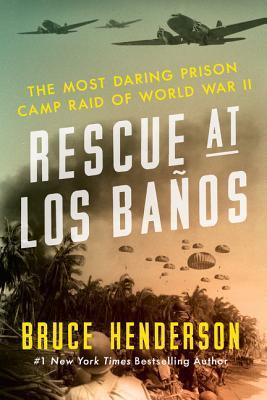
29 Dutch MSC are freed form the concentration camp at Los Baños, Philippines. 20 of them leave for Australia to recuperate. (See below)
24 February, 1869
Father Chevalier is in Naples from February 24-26 and stays with (Blessed) Caterina Volpicelli.
24 February, 1985
Fr. Henri Verjus arrives at Thursday Island after having left Sydney earlier in the month.
25 February, 1875
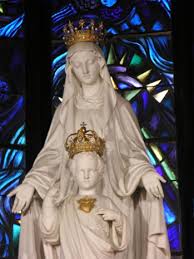
The Holy Office rights to the Bishop of Przemysl in Poland that the Pope has ordered that in the future all new images and statues of Our Lady of the Sacred Heart must represent the Child Jesus on the arms of his mother, and not standing before her.
25 February, 1876
Father Victor Jouet is appointed first General Procurator of the MSC Congregation.
25 February, 1952
MSC sisters, expelled from China, returned to Hiltrup, Germany.
25 February, 1957
Father John Doyle MSC, Australia, appointed Vicar Apostolic of Sideia/Samarai, PNG, is ordained Bishop in Randwick church.
26 February, 1877
Rome, starting on February 26, Fathers Chevalier and Jouet translate the MSC Constitutions into French.
26 February, 1895
The Vicariate of New Pomerania, PNG, is entrusted to the Northern MSC German Province.
26 February, 1908
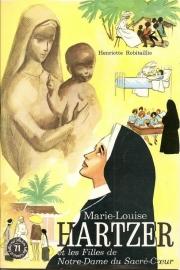
Burial of Mother Marie Louise Hartzer at Thuin, Belgium.
26 February, 1961
Brother James Uratirip, first MSC of the Rabaul diocese, takes his first vows.
28 February, 1962
Erection of the Italian province of the FDNSC.
29 February, 1920
Msgr de Boismenu leaves Yule Island aboard the Tambar for his third holiday in Europe, February 29 1920-November 20, 1921).
Los Banos
From the bestselling author of Hero Found comes the incredible true story of one of the greatest military rescues of all time, the 1945 World War II prison camp raid at Los Baños in the Philippines—a tale of daring, courage, and heroism that joins the ranks of Ghost Soldiers, Unbroken , and The Boys of Pointe du Hoc . In February 1945, as the U.S. victory in the Pacific drew nearer, the Japanese army grew desperate, and its soldiers guarding U.S. and Allied POWs more sadistic. Starved, shot and beaten, many of the 2,146 prisoners of the Los Baños prison camp in the Philippines—most of them American men, women and children—would not survive much longer unless rescued soon. Deeply concerned about the half-starved and ill-treated prisoners, General Douglas MacArthur assigned to the 11th Airborne Division a dangerous rescue mission deep behind enemy lines that became a deadly race against the clock. The Los Baños raid would become one of the greatest triumphs of that war or any war; hailed years later by Chairman of the Joint Chiefs of Staff, General Colin Powell: “I doubt that any airborne unit in the world will ever be able to rival the Los Baños prison raid. It is the textbook operation for all ages and all armies.” Combining personal interviews, diaries, correspondence, memoirs, and archival research, Rescue at Los Baños tells the story of a remarkable group of prisoners—whose courage and fortitude helped them overcome hardship, deprivation, and cruelty—and of the young American soldiers and Filipino guerrillas who risked their lives to save them.
A Retreat opportunity, St Mary's Towers, Douglas Park
A Retreat opportunity, St Mary's Towers, Douglas Park
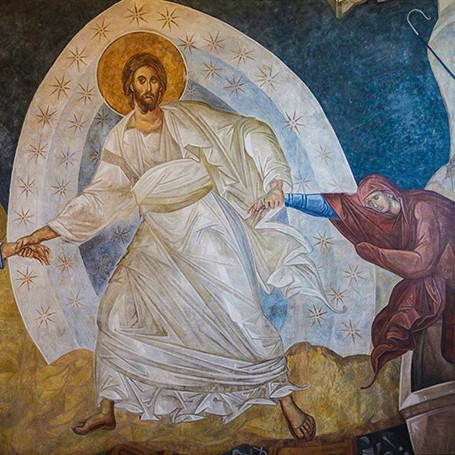
WALKING WITH JESUS IN LOVE AND PRAYER THROUGH HIS PASSION, DEATH AND RESURRECTION
Easter Guided Retreat (This will be a Silent Retreat)
BEGINS: 6PM TUESDAY 26 MARCH, CONCLUDES: EASTER SUNDAY 31 MARCH
COST: $850 all inclusive
Wednesday of Holy Week
5pm Eucharist
7.30pm Second Rite of Reconciliation
Holy Thursday
7pm Evening Mass of the Lord’s Supper
Good Friday
11am Stations of the Cross
3pm Veneration and Holy Communion
Holy Saturday
7pm The Easter Vigil
Easter Sunday
9am Presentation
12.30pm Lunch (followed by conclusion of Retreat)
All inclusive
• meals
• accommodation
• presentations
• accompaniment for those who request it
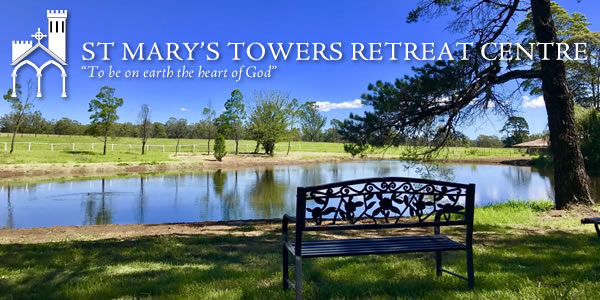
For further information and application form, please contact:
Fr. Stephen Dives msc | 02 4630 0237 or 0405 695 535 | This email address is being protected from spambots. You need JavaScript enabled to view it.
5th General Councillor named, Gene Pejo MSC
5th General Councillor named, Gene Pejo MSC
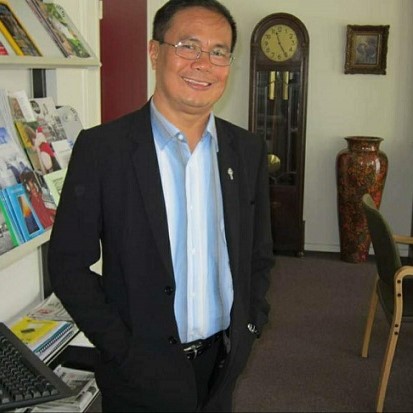
The Superior General has confirmed the appointment of a fifth General Councillor, as anticipated and agreed to at the General Chapter of 2023 and foreseen in MSC Constitutions and Statutes No. S 205. For the six-year term 2023-2029, the fifth General Councillor is Fr Gene Pejo MSC of the Philippines Province.
Over the coming weeks we will post some bios of the 5 Councillors.
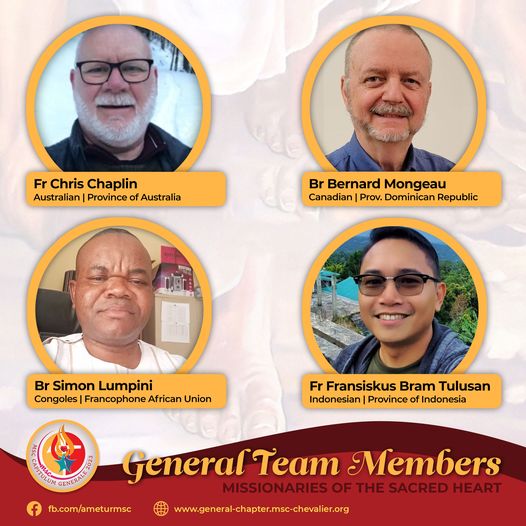
In the meantime, a reminder:
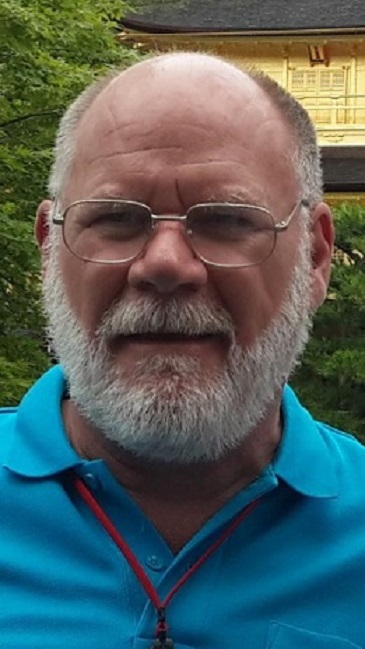
Fr Chris Chaplin MSC of the Australian Province is the 1st Councillor, and our congratulations and best wishes for his responsibilities that he would never have imagined when he joined the MSC in 1980.
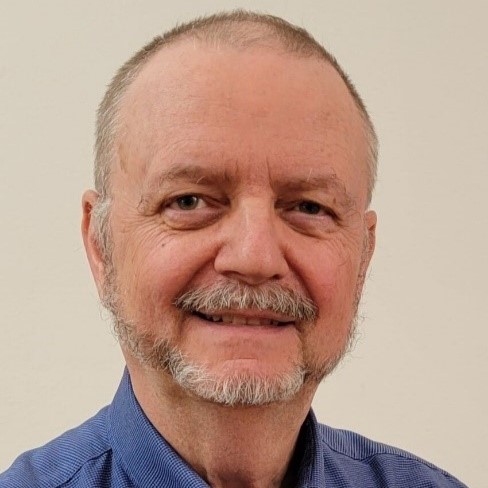
followed by Br Bernard Mongeau MSC from Canada,

Fr Bram Tulusan MSC from Indonesia,
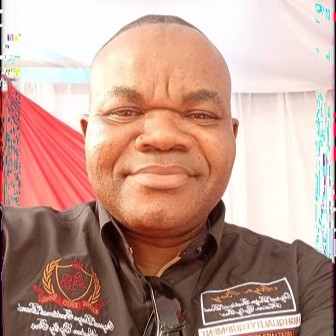
Br Simon Lumpini MSC from the Democratic Republic of Congo,
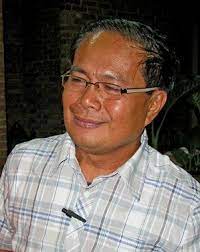
and Fr Gene Pejo MSC from the Philippines.
